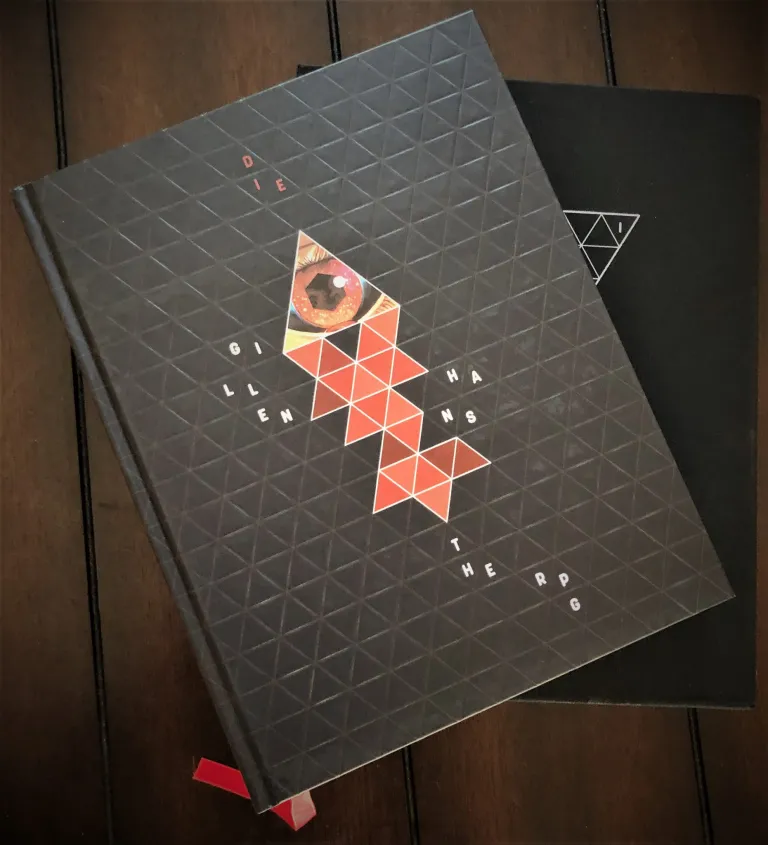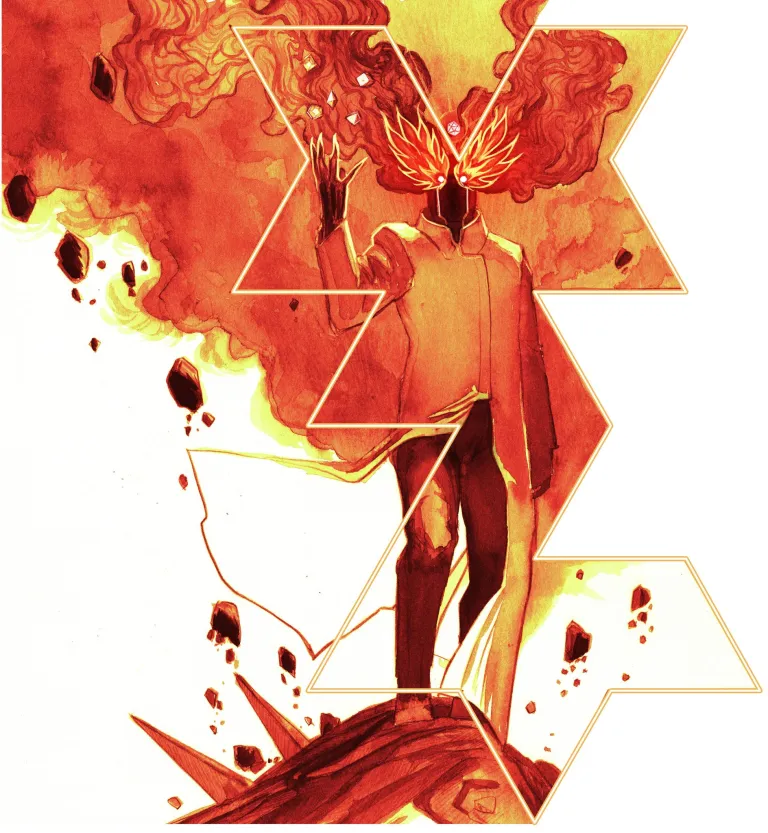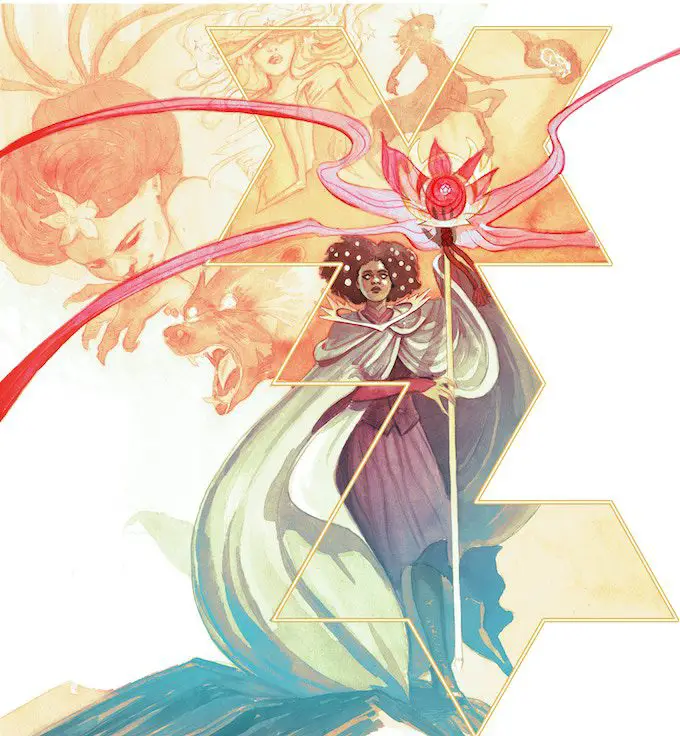This year at Gen Con was the big debut of the TTRPG adaptation of famous comics. No, not the one put out by the big dog that has all those superheroes. I’m referring to DIE The Roleplaying Game, an adaptation of Kieron Gillen and Stephanie Han’s popular Image Comics title of the same name. Published by Rowan Rook, and Decard, publishers of Spire, Heart: The City Beneath, and a successful line of One Page TTRPG’s, the book is the TTRPG debut for Mr. Gillen himself. At the con, I was able to pin the writer down for a quick interview to find out (after I had my nerd out moment over meeting the writer of Dr. Aphra and Immortal X-Men) what went into designing the new game.
___________________________________________________________________________________________
Being the debut of a brand new title for a brand new audience (it was also Kieron’s first Gen Con) I wanted to see how people were reacting to the new game.

Kieron Gillen: It’s very hard to judge, because RPGs are both private and public, but there’s lots of incredible positive feedback. We have an ongoing Discord community that’s been going all the way for the beta where people have been great. But there’s been a lot of actual players and people are finding it useful, and people who know what’s out there like it, and people who haven’t really dabbled on that side of the industry, get a kick from it as well.
I just drilled down into a certain, this is what the story is. Here are broken people, and here we are and this is how you touch them. People have asked me “how do you write this the ‘Kieron Gillen’ way.”
“And the real question there is “how do you make broken people, and then how do you emotionally hurt them? “
And then how do they achieve transcendence? I’ve tried to turn that into game structure and mechanics. We call it the DIE ritual, the word ritual being something Zach (Rowan, Rook, and Decard Producer Zach Cox) came up with. We said ‘Here are a series of rituals that you must do to summon this story.
Kieron has a history with TTRPG’s, evident in their inclusion in the source material. As he himself told me “nobody sits down to write an RPG just because.” But I wanted to find out where that love came from, what his “Secret Origin” was on the tabletop.
KG: I’m of the age where I saw the first wave of commercial breakthroughs and RPGs. By which I mean the Red Box of D&D. I was never a big D&D guy specifically, though. But when I was like 10 the Games Workshop edition of ICE’s Middle Earth Role Playing Game came out (AKA MERP). That’s not the game for 10 year olds, so we didn’t really play it correctly. We actually cut out little the figures and pushed them around and made some noises. We did also roll on the tables, because we had no idea what they meant, but tables are cool! From there they were just a major part of my life: I played Paranoia, and Warhammer, and first and second editions of of Cyberpunk.

It was these experiences that drove the creation of DIE, mining his own experience with games and taking from the TTRPG scene as he saw it.
KG: I was 16 in 1991, and so is the cast in the comic. So I’m mining that specifically, what it’s like to be a teenage roleplayer. And not even specifically the sort of teenage roleplayers we were. It’s in culture, they present RPG as a one size fits all kind of geek, but I was trying to a bit better than everyone else. That kind of awful “Oh, I’m not gonna play D&D, that’s not hardcore enough, that’s not artistic enough” That’s the kids in DIE.
In the time period between his discover of TTRPG’s he dipped in and out, getting interested in some titles but not really engaging like he had. But when he came back “Hard” in 2013, things had shifted.
KG: Now we’re taking it seriously. There’s been a lot of TTRPG comics, and they’re quite often playful in tone, and DIE is really different. It’s desperately pretentious. Very seriously. It’s funny, it’s playful and it’s wry, but at the same time it’s still DIE the game. We kind of circle around the pressure. Why are these people playing RPGs? Why do we need this? And what they choose is often bad in reality. And of course, by asking that question about character, you’re asking each about yourself as well.
“You may say ‘That doesn’t sound fun,’ but at the same time you get the kill dragons.”
There’s plenty of deconstructive and parodic titles in TTRPG, and for many experienced players it can be fun to take apart the conventions of the genre, the rules and weird things we do in our games.
KG: Paranoia was the first RPG I was aware that was solved. By which I mean it was a real world, it name checks Sartre and Orwell and who else on the back. At the time, I didn’t really realise, it’s also a game that’s extensively a satire of RPGs. These are people who kill stuff for no reason. The whole thing is explicitly designed as somebody who’s quite angry at RPGs. That’s always been appealing to me.
When it came to making the game however, it wasn’t always easy.
“I call it the first arc of the comic fantasy heartbreaker.”

KG: I take games on very seriously. I think all games have fundamentally the same: an RPG is a board game is a video game is tag. All these things are coming from the same place. So I’ve been thinking about games all my life in that way, and I’ve certainly been studying games. We spent four years in beta. I wrote it, and we tweaked, and we played, and we published, and changed.
That devotion was palpable when speaking to Gillen. He’s ribbing TTRPG’s because he enjoys them and he’s quite open about how the many games hes played and read have influenced the creation of DIE The RPG.
KG: When people read the manual, I hope they see it isn’t really D&D. It uses the conventions of D&D, but it’s only like…the hats. It doesn’t play anything like D&D. There’s a lot of stuff I actually mention like “I’ve taken this bit from Blades In The Dark.” It’s not just the people who played the comic, there’s a chance of some people who don’t really know indie RPGs. So I’ve got this game but in the back I’ve got a list saying “Hey if you liked this, you’ll fucking love these.” It’s awesome. That’s how I approach the form with.
“I do it because I’m in love With it, and I do not think it’s easy.”
You can pick up DIE The Roleplaying Game from the Rowan, Rook, and Decard shop in PDF form (MSRP $25.00), Hardback (MSRP $55) or as a deluxe slipcover (MSRP $95.00). You can also get a bundle containing the book, a GM screen, dice, and coins for about $130.
Images via Rowan, Rook, And Decard
Have strong thoughts about this piece you need to share? Or maybe there’s something else on your mind you’re wanting to talk about with fellow Fandomentals? Head on over to our Community server to join in the conversation!

